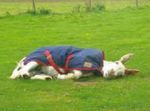Geriatric Donkey
Introduction

For the purposes of this article the ‘geriatric’ donkey will be taken as one that has reached the age of 20 years. Many donkeys in the UK live far beyond this somewhat arbitrary age designated for veteran status.
Whereas veterinary clinicians working within developing countries rarely see a donkey over the age of 12 years, in the UK it is quite normal to be presented with a donkey well over 30 years of age. Whilst some exceptional animals manage to live happy and comfortable lives well into their forties, it is useful to remember that the average age of death of donkeys at The Donkey Sanctuary in Sidmouth, Devon, is still 27 years of age (Svendsen, 1997).
This chapter will try to help guide the clinician to recognise and treat the most common problems encountered when dealing with elderly donkeys. Many such conditions are simply those of old age and are similar in many ways to those encountered in any other ageing population of animals. Appropriate management and basic analgesia can ensure the geriatric animal has a comfortable and happy old age.
Donkeys maintain a strange position in the UK animal-owning population. They are physically large animals, but as often as not they are regarded by their owners as companion animals, much the same as their dogs and cats. This dichotomy can bring about clinical challenges rarely seen with other species.
In the UK, donkeys live a pasture lifestyle and many of their clinical problems arise from too much food and not enough exercise, the results of which are exacerbated as the animal reaches old age. Owners often need to be made aware that any animal over 20 years of age is in fact an ‘old age pensioner’ and as such will be susceptible to geriatric disorders.
Prevention is always preferable to cure and as the animals start to reach old age it is wise to encourage owners to have an ‘MOT’, or regular health examination, carried out on their donkeys. Initially an annual visit will suffice, progressing to twice yearly check-ups. These visits will allow the clinician to assess the condition and quality of life of the donkey. Ideally these assessments should be carried out by the same clinician within the practice so subjective issues such as body condition scoring can be assessed with continuity. Such visits allow the clinician to assess the health of the animal and thereby avoid more acute problems such as hyperlipaemia and intestinal impactions.
It is a fact of life that many of the conditions seen in old age are not curable, the best the clinician and owner can offer often being analgesia, husbandry and general tender, loving care. Treatment is usually supportive and often based on common sense rather than highly technical regimes. Owners should be made aware that care of the elderly animal is likely to be an increasingly time-consuming one, but rewarding nonetheless.
Specific conditions to consider when examining the geriatric donkey
The older donkey is equally liable as its younger counterparts to be affected by conditions described elsewhere in the Donkey Clinical Section and this should always be taken into account when assessing an elderly animal. However, in common with senior members of any population, the aged donkey becomes increasingly liable to suffer from a selection of age-related conditions. These conditions are usually the result of wear and tear and include dental disease, musculo-skeletal problems and miscellaneous conditions affecting metabolic and organ function.
Geriatric Donkey Dental Disease
Chronic Foot Disease of Geriatric Donkeys
Management of chronic musculo-skeletal problems
Blind and Sight-Impaired Donkey
Older Donkey Diet and Management
Literature Search
Use these links to find recent scientific publications via CAB Abstracts (log in required unless accessing from a subscribing organisation).
Geriatric donkey related publications
References
- Sprayson, T. (2008) The care of the geriatric donkey In Svendsen, E.D., Duncan, J. and Hadrill, D. (2008) The Professional Handbook of the Donkey, 4th edition, Whittet Books, Chapter 13
- Crane, M.C. (2002). ‘The care of the geriatric donkey’. BEVA Congress presentation. September 2002.
- McGowan, C. (2003). ‘Diagnostic and Management Protocols for Equine Cushing’s Syndrome’. In Practice (2003) 25. pp 586-592.
- Svendsen, E.D. (1997). ‘Donkeys Abroad’. Professional Handbook of the Donkey, 3rd Edition. Whittet Books Ltd, London. pp 166-182.
Suggested reading
- Baker, G.J., Easley, J. (1992). Equine Dentistry. W.B. Saunders Co. Ltd.
- East, L.M., Savage, C.J., and Traub-Dargatz, J.L. (1991). ‘Weight loss in the horse: a focus on abdominal neoplasia’. Equine Veterinary Education 11(4). pp 174-178.
- Eley, J.L. (1998). Keeping your donkey healthy. Donkey Breed Society.
- Lizarraga, I., Sumano, H., and Brumbaugh, G.W. (2004), ‘Pharmacological and pharmacokinetic differences between donkeys and horses’. Equine Veterinary Education (2004) 16 (2). pp 102-112.
- Marr, C.M. (1994). ‘Clinical manifestations of neoplasia’. Equine Veterinary Education 6(2). pp 65-7.
- Reid, S.W.J., Howie, F. (1992). ‘Factors associated with neoplastic disease in the horse’. Equine Veterinary Education 4(2). pp 66-68.
- Taylor, R.C.R., Hillyer, M.H. (1997). Diagnostic Techniques in Equine Medicine. Chapter 3, ‘Chronic Wasting’. W. B. Saunders Co Ltd, Toronto, Canada.
- Traub-Dargatz, J.L., Fettman, M.J., and Dargartz, D.A. (1992). ‘Identifying the cause of weight loss in horses’. Veterinary Medicine 87. pp 346-355.
- Watson, T. (1998). Metabolic and Endocrine Problems of the Horse. Chapter 2, ‘Equine Hyperlipaemia’. W.B. Saunders Co. Ltd, Toronto, Canada.
|
|
This section was sponsored and content provided by THE DONKEY SANCTUARY |
|---|
